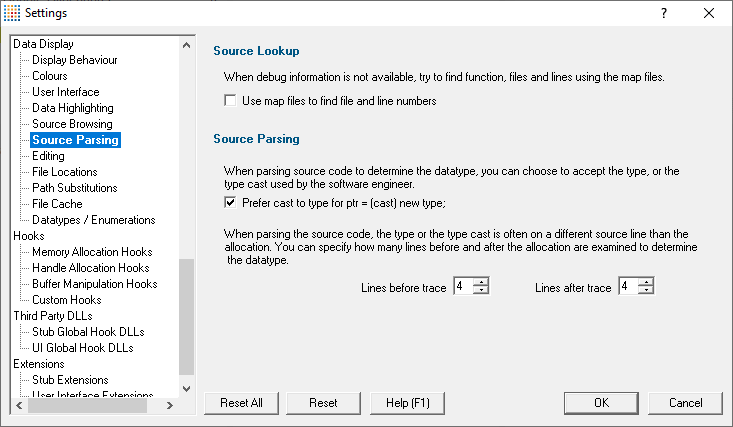The Source Parsing tab allows you control how source code is parsed and what the default behaviour is when symbol debugging information is not found.
The default options are shown below:

Source lookup
When debugging information is missing or unavailable, you can choose one or more of the following methods to try and resolve the symbols:
•Use map files to find file and line numbers  use linker .map files
use linker .map files . Faster than using .Bsc files
. Faster than using .Bsc files
•Map Ordinals to function names  use linker definition .def files
use linker definition .def files . Fast, though not usually needed in addition to the other two options
. Fast, though not usually needed in addition to the other two options
•Use Bsc files to find file and line numbers  use compiler .Bsc source code browser files
use compiler .Bsc source code browser files
 See also: topics on File Locations and Ordinal Handling,
See also: topics on File Locations and Ordinal Handling,
Source parsing for data types
Normally Memory Validator can get data type information from the debug heap, but this is not always possible (see below for reasons why parsing may be necessary).
Parsing the source code is an alternative way to determine the data type of an allocation, and the following settings are then used:
•Lazy source code parsing  the data type will be determined when it needs to be displayed rather than at the time of detecting the allocation
the data type will be determined when it needs to be displayed rather than at the time of detecting the allocation
With 'lazy' parsing, the object type statistics on the Types page will be incorrect, but Memory Validator may appear to execute faster.
•Prefer cast to type...  uses the cast type at the source code location in preference to the original type
uses the cast type at the source code location in preference to the original type
When parsing source code, a few lines before and after the specified line will be examined to try and detect the appropriate type. This is because the debug information doesn't always align exactly with the line in the source code that would be considered correct by a person viewing it.
•Lines before / after trace  specify how many lines of source around the allocation point are examined in order to try and determine the data type
specify how many lines of source around the allocation point are examined in order to try and determine the data type
Why source code parsing may be necessary
As mentioned above, Memory Validator can normally get data type information from the debug heap.
However, the type information in the debug heap is not always present, depending on how the source code was compiled, and in particular, that information is of no help for allocations made using non CRT functions such as HeapAlloc().
For some Win32 handle functions, the handle type is defined by the function, so the type doesn't need to be determined, but for those allocations where a type could not be found, Memory Validator will try to ascertain the type by examining the source code.
Parsing Errors - wrong type
Sometimes you may get an incorrect type from our parser.
Although the search for the type is in the surrounding n lines, we parse the whole file, and if our parser fails due to a construct it is unfamiliar with that may cause an incorrect type to be assigned.
If this happens, please contact support@softwareverify.com.
To debug parse errors, we will always need a copy of the source file (the whole file, not a fragment), the line number concerned and the incorrect type. If you need an NDA, that is not a problem.
Reset All - Resets all global settings, not just those on the current page.
Reset - Resets the settings on the current page.